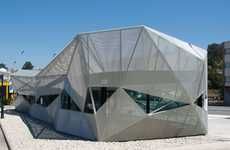
NYU CoGeneration Plant Dishes Out Serious Eco Power
This new NYU CoGeneration plant is a super efficient generator that doubles the university's power output while greatly decreasing its pollutant emissions.
By switching to natural gas instead of oil, the NYU CoGeneration plant offers 23 percent less cabron emissions. The most important part of the new facility, however, is that it lets as little energy go to waste as possible. In addition to generating power from burning the gas itself, the heat from that process is used to power a turbine via steam in order to generate a second source of energy. On top of that, the wasted water from this turbine is then used to heat water for the entire campus.
By switching to natural gas instead of oil, the NYU CoGeneration plant offers 23 percent less cabron emissions. The most important part of the new facility, however, is that it lets as little energy go to waste as possible. In addition to generating power from burning the gas itself, the heat from that process is used to power a turbine via steam in order to generate a second source of energy. On top of that, the wasted water from this turbine is then used to heat water for the entire campus.
Trend Themes
1. Super Efficient Energy Generation - The NYU CoGeneration plant demonstrates the potential for maximizing energy output while minimizing emissions through innovative technologies.
2. Transition to Natural Gas - The use of natural gas as a fuel source presents an opportunity for reducing carbon emissions and improving overall sustainability in power generation.
3. Waste Heat Recovery - The utilization of waste heat in power generation systems can enhance energy efficiency and contribute to the development of more sustainable energy plants.
Industry Implications
1. Power Generation - The power generation industry can explore the adoption of super efficient energy plants to enhance electricity production while reducing environmental impact.
2. Energy Infrastructure - The implementation of co-generation plants and the transition to natural gas can drive innovation in the energy infrastructure sector, optimizing energy supply and lowering emissions.
3. Higher Education - The education industry, particularly universities and colleges, can adopt co-generation plants to reduce energy costs and demonstrate sustainable practices to students and the community.
1.9
Score
Popularity
Activity
Freshness























